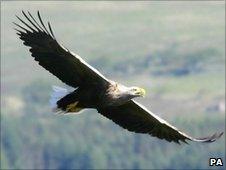Sea eagle plan hits turbulence in East Anglia
- Published

Sea Eagle in flight. Photo: Iain Erskine/RSPB Scotland
In a rural field close to the Suffolk coast, a pig farmer has been trying to warn off the UK's largest bird of prey with a poster campaign.
In red and black letters, the message on the billboard is clear: "Say No To Sea Eagles Here."
Now, it seems, his wish may have come true.
The sea eagle, or white-tailed eagle, is a rare and protected bird with a wingspan of up to 8ft (2.5m).
It was hunted to extinction in the British Isles, but over the last 30 years it has been re-introduced successfully in parts of Scotland.
Delighted
For several years, Natural England, and the RSPB, have been planning to do the same in East Anglia, with Suffolk's wetland coast identified as the best location.
The sea eagle project was expected to last five years and to cost £600,000, but its whole future is now in doubt.
Natural England has announced the withdrawal of its financial support. It said it could no longer afford the long-term commitment.
In the breeding area of his open-air pig farm, with young pigs chasing each other through the mud, Jimmy Butler said he was delighted at the news.
"It's an absolute total relief to us. This was madness in the first place," he said.
"This bird would have killed a lot of our pigs, jeopardised our income, and jeopardised our business in total. We are so relieved we can now just get on with keeping pigs."
The big fear for pig farmers was not that sea eagles could have eaten their animals, but that they would have caused panic as they flew overhead, causing breeding sows to crush their young.
On a nearby poultry farm, Chris Ford had similar concerns about his free-range hens.
"We try to keep the hens as stress-free as we can," he said.
"If I had a sea eagle come over here with an 8ft wingspan, the hens would be so easily panicked.
"They would lay fewer eggs, and if they got spooked they would all pile into the shed at once, on top of each other, and kill each other.
"It's very good news that Natural England has listened to us."
But Natural England insists that local opposition has nothing to do with its decision to stop funding the sea eagle project.
Natural England's chief scientist, Tom Tew, said the decision was purely financial.
"We're not bowing to opposition," he said.
"We have listened to farmers and landowners and they have entirely legitimate concerns, but all of the research shows that their concerns are either unfounded, or could be overcome.
"Today's decision is about the current economic climate, and the need to focus ruthlessly on our existing commitments."
The RSPB said it was disappointed at losing its partner in the re-introduction project, but that it was still committed to bringing the sea eagle back to English skies.
A spokesman said the project was postponed rather than cancelled, and that the charity would now be looking at alternative ways of funding a re-introduction scheme, in Suffolk or in a different part of England.
Nevertheless, Suffolk's "No" campaigners will undoubtedly see the project being put on hold as a victory against what they say is a dangerous bird of prey.